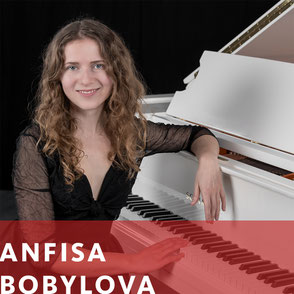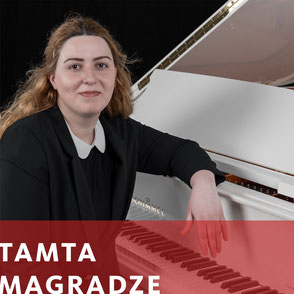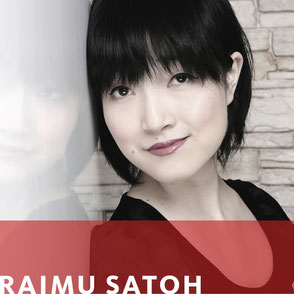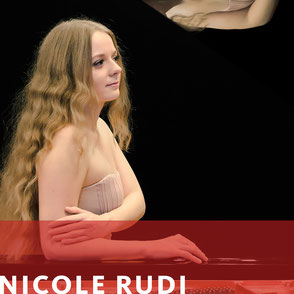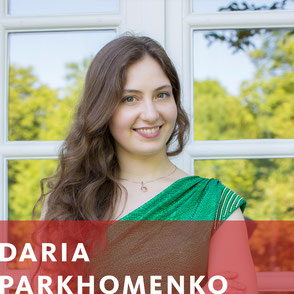INTERNATIONAL SCHIMMEL Piano Competition
The International Schimmel Piano Competition is organized by the Wilhelm Schimmel Pianofortefabrik GmbH in Germany and will be held in its third edition from 01 to 03 March 2024.
The competition is for pianists aged 18 to 32 who are currently undergoing or have completed professional musical training. In addition to the quality of the performance, the focus of the competition lies in the conception of the presented programme, which must follow a theme chosen by the participants.
The prize-winners have been chosen!
The jury has decided:
After three thrilling days of competition, Anfisa Bobylova was awarded 1st prize, endowed with 6,000 euros.
The 2nd prize was awarded to Elizabeth Goh and the 3rd prize to Tamta Magradze. In addition to the outstanding pianistic performances, our jury was particularly impressed by the original concert programmes!
The 3rd International Schimmel Piano Competition 2024 culminated in a spectacular prize-winners concert in the Schimmel Concert Hall on Sunday evening. Following the concert, the sought-after audience prize of 500 euros was awarded to Anfisa Bobylova.
We would like to thank all the helpers, this year's finalists and the numerous visitors for three memorable competition days!
Prize-winners Concert

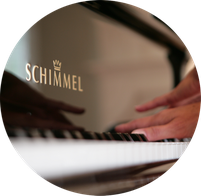
When and where?
1st competition round
01-02 March 2024
Location:Schimmel Concert hall- Friedrich-Seele-Straße 20, 38122 Braunschweig
Final competition round & prize-winners concert
03 March 2024
Location:Schimmel Concert hall - Friedrich-Seele-Straße 20, 38122 Braunschweig
Expand details
REGISTRATION & PRESELECTION
Apply by November 30th, 2023 with a video and your written programme conception to participate in the International Schimmel Piano Competition 2024:
The application period is over.
COMPETITION
01-02 March 2024: 1st competition round
The participants present a 20-30 minute programme of their own design to the jury and the audience. Participants must also explain their programme idea to the jury in a maximum 2-minute oral presentation (German or English) before the start of the competition.
The six participants with the highest number of points will reach the final round.
03 March 2024: Final competition round
The participants will present a second programme of their own design with a duration of 30–50 minutes. Participants must also explain their programme idea to the jury in a maximum 2-minute oral presentation (German or English) before the start of the competition.
WINNERS' CONCERT
03 March 2024: Prize-winners concert
The three participants with the highest score will present their programmes from the final competition round in a public prize-winners concert.
Please note: Photos and videos will be taken during the event for public relations purposes.

Awards
1st prize 6.000,- Euro
2nd prize 3.000,- Euro
3rd prize 1.500,- Euro
Audience Award 500,- Euro
Schimmel Pianos has already organized concert tours with selected artists on a regular basis in the past. All competition winners have the exclusive opportunity to be selected on the basis of their outstanding performance and special suitability to plan and organize a concert tour in collaboration with Schimmel Pianos in the coming years.
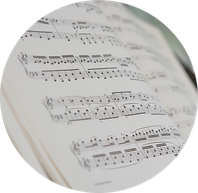
Repertoire (please read carefully!)
The distinctive feature of the Schimmel Piano Competition is that the program to be performed must be independently conceived and follow a thematic idea. The result should be an attractive concert program in which the concept of the program is ideally already understood from its title and the chosen works without further oral or written explanations. Thus, in addition to the pianistic-artistic quality, the attractiveness and originality of the submitted concert programs will also be evaluated.
The program concept can deal with the connections as well as with contrasts and breaks between the individual works, and thus show references beyond the boundaries of epochs and genres. Improvisations and compositional interventions are permitted if the concept convincingly demands them. A curious immersion in the abundance of piano literature is strongly recommended!
Expand details
The themes or headings of the program concepts may be abstract or concrete, and may be drawn from all sorts of fields: Mythology, literature, everyday life, nature, history, visual arts, life experience, technology, psychology. These are just a few examples. However, compositional or instrumental features can also be used to create a consistent program (e.g. "preludes", "capriccio", "staccato", "octaves"). Therefore, the possibilities are limitless.
Decisive in the conception of the program are artistic independence, individuality, originality, comprehensibility and attractiveness (entertainment value, pedagogical effects) for an audience. Participants must explain their program idea to the audience and the jury in a maximum 2-minute introduction in German or English before the start of the competition. This introduction is mandatory.
The individual works of the program can be chosen freely and should, of course, meet high pianistic-artistic standards.
Two different program concepts must be prepared for the 1st competition round and the final round. Works from the 1st competition round may only be repeated in the final round if it is necessary for the realization of the intended program idea.
Concept example for the 1st competition round on the topic of "Dance voyage through the world of the 19th century"
- Moritz Moszkowski (1854–1925): Polonaise in B minor, op. 55 no. 3 (5,30 min.)
- Enrico Granados (1867–1916): Valses poéticos (11 min.)
- Louis Moreau Gottschalk (1829–1869): Bamboula, op. 2 (7 min.)
- Mili Alexejewitsch Balakirew (1837–1910): Tarantella in B major (7 min.)
Duration of the 1st competition round: 20 to 30 minutes
Dance functions without any words and is therefore found in all nations and social classes, but can also be communicated across borders. In the piano music of the 19th century, there are excellent compositions for the folk dances practised at that time in practically every country. For a journey around the world, the works of these 4 composers offer an excellent cross-section:
Moritz Moszkowski's Polonaise op. 55 belongs to a collection of four Polish folk dances. The Polonaise with its catchy melody sounds very majestic and dignified, but thus also perfectly corresponds to the character of this Polish national dance.
In the nine-part cycle Valses poeticos, Enrico Granados makes the waltzes sound less vivacious and more poetic. The Spanish soul can be found in the tender, melancholy melodies, which wonderfully "turn" and "waltz".
"Bamboula" was originally the name of an African drum dance with the characteristic of shouting, rattling, twirling and contorting. In the 19th century, black slaves in New Orleans in particular danced the Bamboula and sang to it in their respective languages, sometimes with the support of drums and wooden trumpets.
With the Tarantella, a folk dance from southern Italy, Mili Balakirew has composed an energetic piano piece that demands a lot from the pianist, but also corresponds very well to the character of the dance. The wild tarantella dance was performed by people after a scorpion or spider bite in order to expel the poison from the body.
Concept example for the final round on the topic of "Composed Improvisation"
- Johann Sebastian Bach (1685-1750): Chromatic Fantasia and Fugue, BWV 903 (12 min.)
- Wolfgang Amadeus Mozart (1756-1791): Variations in G major, KV 455 "Unser dummer Pöbel meint" (13 min.)
- Ludwig v. Beethoven (1770-1827): Fantasia in G minor, op. 77 (10 min.)
- Frédéric Chopin (1810-1849): Prelude in F minor, op. 28 no. 18 (1 min.)
- Karlheinz Stockhausen (1928-2007): Klavierstück XI (14 min.)
Duration of the final round: 30 to 50 minutes
The works in this example move between the traditional improvisation of the Baroque, which is presented here in composed form, and aleatoric music, which demands improvisational actions from the performers. In between, the historically interesting variations KV 455 by Mozart, which the composer improvised as an encore in honour of Christoph Willibald Gluck, who was present at a concert, and which was later written down.
Further concept examples can be found on the page of the public final of the International Schimmel Piano Competition 2022: Final 2022

Jury
The jury of our International Schimmel Piano Competition consists of outstanding personalities from the world of piano music: five internationally renowned pianists and professors evaluate the auditions and programs during the competition and select the most convincing finalists. The jury members' decisions are based on their exceptional expertise in technique, program conception and in-depth experience in music education. The members represent a wide range of backgrounds and notable careers, all of which contribute to the diversity of our esteemed jury.
For more information about our jury members, please visit the following page: Jury 2024

How can I participate?
Who can participate?
Participants must be between 18 and 32 years of age at the time of the competition. Pianists who are in or have completed professional musical training are eligible to participate.
How do I register?
Apply by 30 November 2023 with a video and your written programme conception to participate in the International Schimmel Piano Competition 2024:
The application period is over.
Expand details
What do I need to register online?
- Your application video*
-
- 10-15 min.
- MP4
- max. 1 GB
- A portrait photo
-
- JPG, PNG
- professional quality
- max. 10 MB
- Copy of your passport or identity card
-
- JPG, PNG, PDF
- max. 10 MB
We also need from you:
- The programme concepts for the 1st competition round (20-30 minutes) and the final round (35-50 minutes), including the planned play literature (maximum one DIN A4 page per concept + title of the pieces, composers, length of the pieces).
- Your brief vita (max. 2500 characters)
* What should I consider when creating the video?
- Play a freely chosen repertoire for piano solo with a duration of min. 10, max. 15 minutes
- Your face and hands should be clearly visible
- The video should be uncut and unedited (without effects, zoom, titles or fades)
- The sound recording should be of good technical quality (no dynamic compression)
- The application video must have been recorded within the last 6 months
Your registration is only valid upon complete receipt of the files mentioned.
2024 WINNERS
2022 WINNERS
2021 WINNERS








